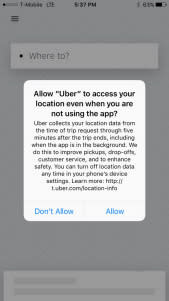Uber’s New Tracking Tool Is More Convenient Than Creepy
If you opened up your Uber app in the last few days, you probably encountered a message like the one below that pressed you to let the ride-hailing service “access your location even when you are not using the app.”
The message gave rise to a predictable series of hand-wringing headlines warning how Uber would now track its users even after they completed a trip. While this might sound sinister, the reality is more banal--and it might even be a good idea.
In a conversation with Fortune, a company spokesperson discussed what is going on, and explained why Uber users can probably rest easy about the recent message.
As the company makes clear on its website, the act of saying “Allow” will not lead to the company recording every step you take. Instead, it grants Uber permission to record your location from the time you request a trip until five minutes after a trip is ended.
Some may wonder why the extra permissions are necessary in the first place given that Uber appeared to track their location already. Indeed, as regular users know, the trip history feature in the app will a display a history of all the rides a customers has taken.
But as it turns out, Uber’s previous permission rules only let the company gather location in the event the app was open and in the foreground of a user’s phone. (Information about ride history is gleaned from driver records).
Get Data Sheet, Fortune's technology newsletter.
The downside to the old rules is that many users would summon a car and then switch to another app -- leading a driver seeking out a static location marker that did not correspond to the user’s exact location. This could lead to a familiar (and frustrating) series of calls or texts as the Uber driver and passenger sought to find each other outside a crowded event or airport terminal.
Under the new permission rules, such mix-ups are less likely since the driver will have the customer’s precise location. Meanwhile, Uber says the five minutes of location data collected after a trip has ended will provide data to ensure a customer was dropped off at an optimal spot--not on the wrong side of a busy street.
The five minute after-the-fact data collection, however, dismays privacy groups like the Electronic Frontier Foundation.
"They may be concerned about getting into some database about their location and may get dropped off across the street. It's sad to take that away,” EFF’s deputy counsel Kurt Opsahl told Buzzfeed.
This concern may be overblown, however, given that any user uncomfortable with Uber’s changes can simply deny location access to to the company in their phone settings and enter an address manually instead.
Long story short, Uber does not appear to be collecting much more information than it already had through driver records, and the new data would allow it to offer better service. Moreover, the company can even claim credit for being upfront about the change rather than burying it deep in an terms-of-service update.
Uber’s privacy practices have certainly raised cause for concern in the past but the current controversy appears to be a false alarm.

